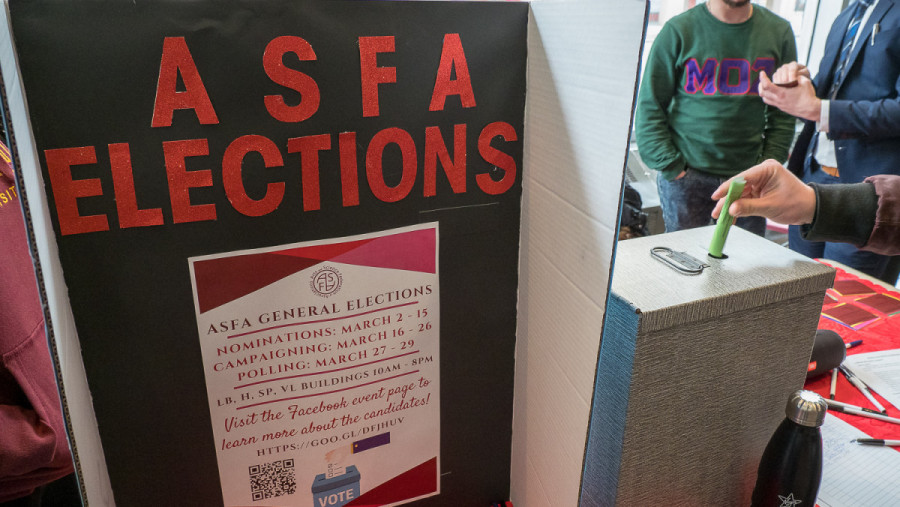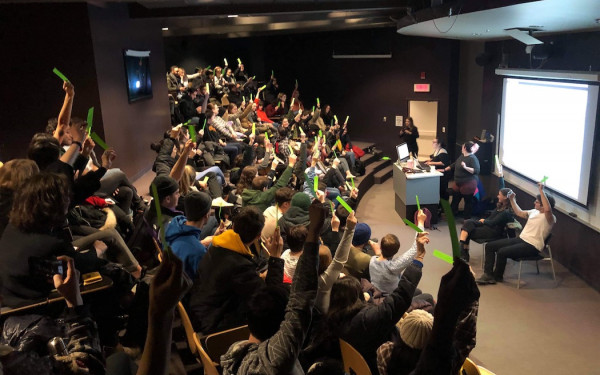ASFA Updates: Online Voting Changes, Member Association Allowances on the Table
ASFA to Use Online Voting Third-Party Platform, Places Cap on Allowances for MAs With Fee-Levies
The Arts and Science Federation of Associations have passed a motion to use SimplyVoting, a third-party platform, to host all future online elections.
SimplyVoting‚—the same platform used in this past CSU general election—is a third-party voting platform which promises easier use than ASFA’s current voting platform, MyVote.
ASFA Advocacy and Executive Coordinator Marguerite Rolland felt a change was necessary after a bad experience with the ASFA general elections, which took place March 27-29.
Some issues with MyVote included no possibility of providing candidate bios on the ballots, Rollard explained. The only possibility for this information to be included was in the form a link, not in the form of a hyperlink, forcing voters to copy paste the link into their web browser to view information on who they may be voting for.
“I do not recommend MyVote nor endorse it in any way,” said Rolland. “It was horrible to set up and required a lot of work for both myself and for the person at Instructional and Information Technology Services to do.”
There was no way of sub-sectioning voting for a department with more than one program, and thus multiple member associations. This issue was brought up just a week before elections, forcing a number of member associations to hold voting with paper ballots at the last minute—a “logistical nightmare,” according to Rolland.
There was also no way for students to be notified of polls opening by email, short of ASFA personally emailing their mailing list the day of. Rolland felt this was not ideal, given that a number of students tend to unsubscribe from this list.
“Once all this was figured out, and all this information was given to elections CEOs, and once the remaining elections that could be online were settled, there was no problem with the system,” said Rolland. “On the user side of things, [MyVote] was more than OK.”
However because of the logistical issues associated with MyVote, ASFA will be using SimplyVoting to host both ASFA and member association elections moving forward. SimplyVoting has provided a quote for the cost of services, including up to 10 elections with 16,000 or less voters.
According to the proposal, this plan would cost ASFA $4208.40, with extra voters in an election costing approximately $0.18 per voter. The proposal also provides add-ons like additional elections for $650 each. There is also a feature which will support online voting for member associations, which fall under departments with more than one program, at a one-time cost of $300.
Member Association Allowance Cap
ASFA has voted to pass a policy that allows the finance committee to restrict member associations’ operational budgets coming from ASFA’s annual budget.
The policy states that member associations with their own fee-levy amounting to over $8,000 shall not receive an operational budget from ASFA. In addition, if these member associations receive an excess of $20,000 per year, they will be deemed ineligible to apply for funding from the member association special project fund.
After finance coordinator Gigi Cordeiro was appointed following former finance coordinator Caleb Owusu-Acheaw’s resignation, she discovered a number of issues with the way ASFA’s finances were handled. Her main concern is the fact that the budget was created with no real consideration of the operational costs to run the organization, which could potentially lead to a deficit.
Cutting unnecessary spending from ASFA’s annual budget in the future by capping funding for member associations with other sources of revenue could help offset a potential deficit in years to come.
“I know that the [Political Science Student Association] has a rather large fee-levy,” explained incoming general coordinator Evan Lee. “That money that was given to the PSSA [by ASFA] this year could be better served if it was possibly distributed to other MAs if they have events or other initiatives. For this reason I think the proposal is a great idea.”
Cordeiro also feels that this is a good way to even the playing field between member associations with their own fee-levies and those who rely solely on funding from ASFA’s annual budget.
“As a member of [the financial committee], I think this is a great initiative mostly because when [the financial committee] makes its annual budget it is a zero-sum game,” explained Jane Lefebvre of the Women’s Studies Student Association. “Someone getting more funds means others will not get those funds.”


_600_832_s.png)

_600_375_90_s_c1.JPG)


